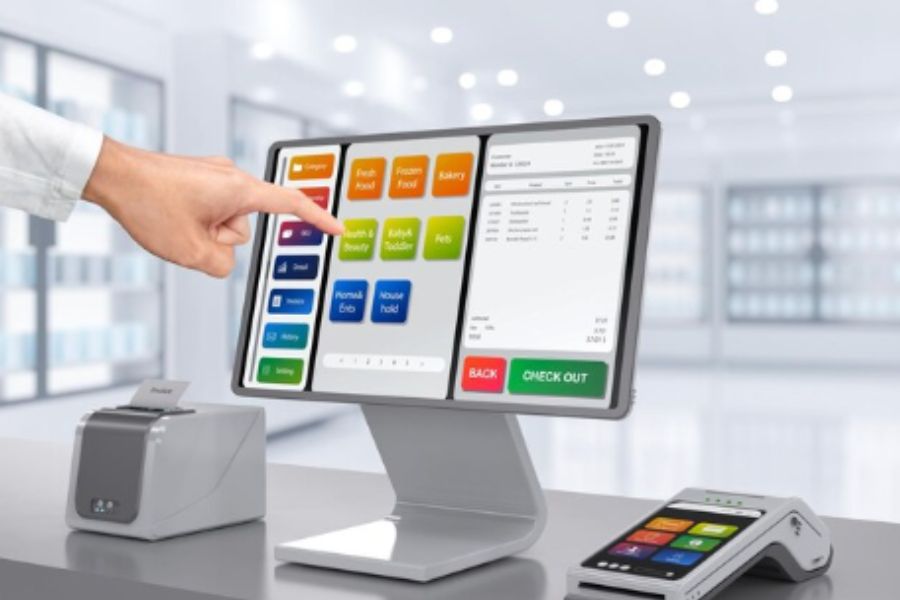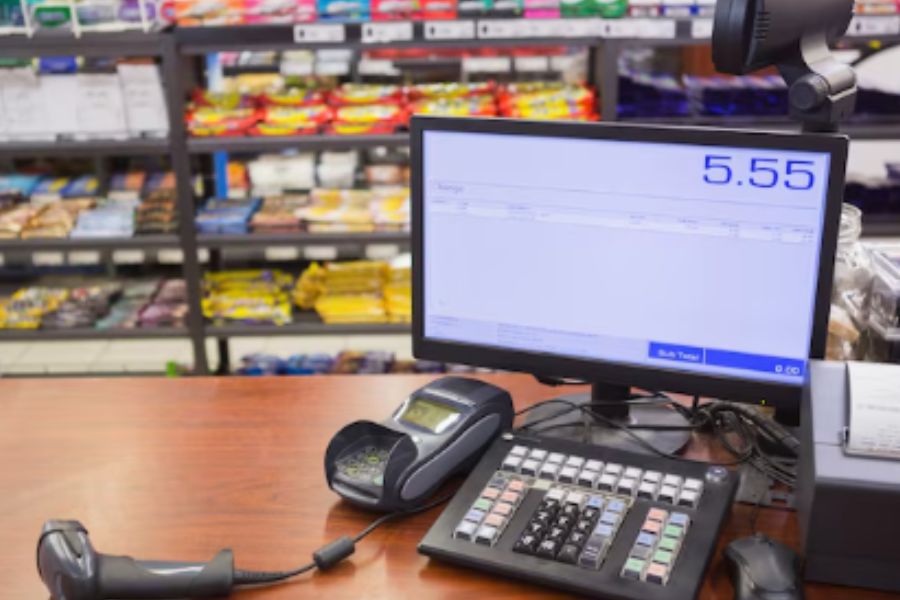Are you seeking the perfect point-of-sale solution for your apparel store? With the rapid evolution of retail, finding the right apparel point of sale system is crucial for enhancing your business’s performance and profitability.
In this blog, we’ll outline the key factors you should consider before investing in an apparel point of sale system. From analyzing your specific business requirements to evaluating features like inventory management and integration capabilities, we’ll provide you with essential insights to guide your decision-making process. Now, let’s get explore!
What is an Apparel Point of Sale?
An apparel point of sale refers to the specific system or software used in retail environments, particularly in fashion boutiques, to facilitate and manage transactions related to the sale of clothing and accessories. By automating and simplifying various steps, these systems streamline the checkout process, leading to improved efficiency for businesses and a more positive customer experience.
In the context of a fashion boutique, an apparel POS system typically includes features such as inventory management, sales processing, and customer relationship management. It allows store owners and staff to efficiently process sales transactions, track inventory levels, manage customer information, and generate reports on sales and other business aspects.
The use of a specialized apparel POS system can contribute to a smoother and more organized retail operation. It helps streamline processes, reduces the likelihood of errors, and provides valuable insights into the business’s performance.
Additionally, these systems often support various payment methods, including cash, credit cards, and mobile payments, enhancing the overall shopping experience for customers.
Overall, an apparel point of sale system plays a crucial role in the daily operations of a fashion boutique, contributing to improved efficiency, accurate record-keeping, and better customer service.
Why Do You Need a POS System for Apparel Stores?
Implementing a POS system in an apparel store offers numerous benefits that streamline operations and enhance the overall customer experience. Here’s why you need a POS system for your apparel store:
It Conserves Time
A POS system streamlines checkout processes, reducing wait times for customers. Employees can quickly scan items, process transactions, and provide receipts, leading to improved customer satisfaction and increased sales.
For example, during busy periods like during sales or holiday seasons, a robust POS system can significantly expedite transactions, preventing long queues and ensuring a smooth shopping experience for patrons.
You’ll Stay Informed
With a POS system, apparel store owners have access to real-time sales data and inventory levels. This information enables better decision-making regarding restocking, pricing, and promotions.
For instance, by tracking which items are selling well and which ones are languishing on shelves, store managers can adjust their inventory and marketing strategies accordingly, maximizing profitability and minimizing losses.
Enhanced CRM Capabilities
Modern POS systems often come equipped with customer relationship management (CRM) features, allowing businesses to track customer preferences, purchase history, and contact information. This data enables personalized marketing campaigns, loyalty programs, and targeted promotions.
For example, an apparel store can use CRM tools to send tailored discounts or recommendations based on a customer’s past purchases, fostering customer loyalty and driving repeat business.
It Exudes a Stylish Appearance
A sleek and modern POS system enhances the overall ambiance of an apparel store, projecting a professional and tech-savvy image to customers. With sleek touchscreen interfaces and stylish hardware, a POS system can complement the store’s aesthetic and reinforce its brand identity.
For instance, a boutique clothing store aiming for a contemporary vibe can choose a POS system with sleek, minimalist design elements that seamlessly integrate into the store’s decor, enhancing its appeal to fashion-conscious shoppers.
10 Considerations Before Buying in an Apparel Point of Sale
In fact, choosing the right point of sale system is a critical decision that can significantly impact the efficiency, profitability, and overall success of your business. Before making a purchase, it’s essential to carefully consider several key factors to ensure that the POS system aligns with your specific needs and objectives.
Here are 10 important considerations to guide your decision-making process:
Efficient Inventory Management
Efficient inventory management is crucial for apparel retailers to optimize stock levels, prevent stockouts, and minimize excess inventory. A robust POS system should offer advanced inventory management features, such as real-time tracking, automated alerts, and accurate reporting.
For example, a modern POS system can track product variations, sizes, and colors, enabling retailers to monitor stock levels accurately and automate reorder processes based on predefined thresholds. By streamlining inventory management, retailers can improve operational efficiency, reduce costs, and enhance the overall customer experience.
Synchronizing Your Online and Brick-and-Mortar Retail Operations
In today’s omnichannel retail landscape, synchronizing online and brick-and-mortar operations is essential for providing a seamless shopping experience and maximizing sales opportunities. A comprehensive POS system bridges the gap between online and offline channels, enabling retailers to centralize inventory management, order fulfillment, and customer data across all touchpoints.
For example, a synchronized POS system maintains a centralized inventory database accessible to both online and physical stores, ensuring accurate product availability information and enabling omnichannel order fulfillment options such as buy online, pick up in-store (BOPIS), or ship from store. With synchronizing operations, retailers can enhance customer satisfaction, drive sales, and build brand loyalty across all channels.
Providing Tailored Customer Experiences
Personalized customer experiences are increasingly important in today’s competitive retail environment, and a sophisticated apparel point of sale system can help retailers deliver tailored experiences that resonate with individual shoppers.
For example, a POS system equipped with customer relationship management (CRM POS) features enables retailers to capture and leverage customer data to personalize marketing campaigns, promotions, and product recommendations.
By analyzing customer preferences, purchase history, and behavior, retailers can segment their customer base and target them with relevant offers and communications, ultimately driving engagement, loyalty, and repeat business.
Cutting-Edge Machine Learning-Powered Recommendation System
Machine learning-powered recommendation systems are revolutionizing the way retailers engage with customers and drive sales. By analyzing vast amounts of data, including past purchase history, browsing behavior, and demographic information, these systems can generate personalized product recommendations that are highly relevant to individual shoppers.
For example, a POS system equipped with a machine learning-powered recommendation engine can analyze customer data in real time and suggest complementary products or upsell opportunities during the checkout process. Retailers can enhance the shopping experience, increase average order value, and drive revenue growth by leveraging machine learning technology.
Empowering Your Staff Members
Empowering staff members with the right tools and resources is essential for delivering exceptional customer service and driving sales. A modern apparel point of sale system should be intuitive, user-friendly, and equipped with features that streamline workflow and empower employees to serve customers effectively.
For example, a POS system with built-in training modules and intuitive touchscreen interfaces enables staff members to quickly learn how to process transactions, manage inventory, and utilize CRM features.
Seamlessly Integrating with Your Current Technology Infrastructure
When choosing a POS system, it’s essential to consider how well it integrates with your existing technology infrastructure, including hardware, software, and third-party applications. A seamless integration ensures smooth data flow and eliminates the need for manual data entry or reconciliation.
For example, a POS system that integrates seamlessly with your accounting software, e-commerce platform, and payment processors enables you to streamline operations, reduce errors, and improve efficiency. With leveraging integrations, retailers can consolidate their technology stack, simplify IT management, and focus on growing their business.
Payment Integration Included
In today’s digital age, offering a variety of payment options is essential for accommodating customer preferences and maximizing sales opportunities. A modern POS system should support a wide range of payment methods, including credit cards, debit cards, mobile payments, and digital wallets.
For example, a POS system equipped with built-in payment integration enables retailers to process transactions quickly and securely, providing a seamless checkout experience for customers. By offering multiple payment options, retailers can cater to diverse customer needs, reduce friction at the point of sale, and increase conversion rates.
Facilitating Targeted Marketing Initiatives
Effective marketing is essential for driving customer engagement, increasing brand awareness, and driving sales. A comprehensive POS system should provide tools and features that enable retailers to execute targeted marketing initiatives tailored to their specific audience segments.
For example, a POS system with built-in CRM capabilities enables retailers to capture customer data, segment their audience, and create personalized marketing campaigns based on past purchase history, preferences, and behavior. By targeting the right audience with the right message at the right time, retailers can increase the effectiveness of their marketing efforts, drive customer engagement, and ultimately boost sales.
Comprehensive Reporting and Analytics
Data-driven decision-making is critical for success in today’s competitive retail landscape, and a modern POS system should provide robust reporting and analytics tools that enable retailers to gain valuable insights into their business performance.
Suppose, a POS system with customizable dashboards, real-time reporting, and advanced analytics capabilities enables retailers to track key performance indicators, monitor sales trends, and identify areas for improvement. By analyzing sales data, inventory turnover, and customer behavior, retailers can make informed decisions, optimize their operations, and drive business growth.
Dedicated Customer Support
Finally, when choosing an apparel point of sale system, it’s essential to consider the level of customer support provided by the vendor. A reliable POS provider should offer dedicated customer support services to assist retailers with implementation, training, troubleshooting, and ongoing maintenance.
For example, a POS provider that offers 24/7 customer support, live chat, and online resources enables retailers to get the help they need quickly and efficiently, minimizing downtime and ensuring a smooth transition to the new system. By partnering with a POS provider that prioritizes customer support, retailers can have peace of mind knowing that help is always available whenever they need it.
In short, choosing the right Point of Sale (POS) system is a critical decision for apparel retailers, and it’s essential to carefully consider several of these key factors before making a purchase.
FAQs: Apparel Point of Sale
How Do I Determine the Right Budget for a Point-of-Sale System?
Determining the appropriate budget for a point of sale (POS) system involves evaluating your business’s specific needs and financial capabilities. Consider factors such as the size of your apparel store, the volume of transactions, desired features, and long-term scalability.
It’s essential to strike a balance between affordability and functionality, ensuring that the chosen POS system aligns with your budgetary constraints while providing the necessary tools to support your business operations effectively.
Can a Point-of-Sale System Be Integrated with My Online Store?
Yes, many modern POS systems offer seamless integration with online stores, enabling synchronization of inventory, sales, and customer data across both online and brick-and-mortar channels. Integration between your POS system and online store facilitates centralized management of product listings, pricing, and customer information, resulting in a cohesive and streamlined shopping experience for your customers.
Be sure to choose a POS solution that supports integration with your preferred e-commerce platform and offers robust features for omnichannel retailing.
What Security Measures Should I Look for in a Point-of-Sale System?
Security is paramount when selecting a POS system to safeguard sensitive customer data and payment information. Look for POS solutions that adhere to industry standards such as PCI DSS (Payment Card Industry Data Security Standard) compliance and employ robust security measures such as data encryption, tokenization, and secure authentication protocols.
Additionally, consider features like role-based access control and audit trails to manage user permissions and track system activity effectively. Prioritize POS vendors that prioritize security and regularly update their systems to address emerging threats and vulnerabilities.
Wrap Up
In a nutshell, investing in an apparel point of sale system is a strategic decision that requires careful consideration of various factors, including budget, integration capabilities, security, and ongoing maintenance. By addressing frequently asked questions and understanding your specific requirements, you can make an informed decision and select a POS solution that meets your business needs and empowers you to deliver exceptional customer experiences.
If you are wondering about looking for a POS system for your apparel store, let’s follow us to learn more information.



